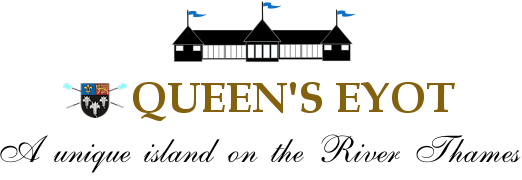
Through historical evidence, it seems that the island received its name from the grant of the manor of Bray to the Queen or Queen Dowager of England in 1299. "Eyot" is old English and is the definition given to a small island or islet mostly found in rivers, and is pronounced 'eight'.
In 1898, Colonel Victor Van de Weyer came to the College with a generous and timely offer. His suggestion was that the College might find a use for Queen's Eyot. Although Dr Warre (the Head Master of Eton at the time) and Mr Churchill went to visit the island on a wet and dreary afternoon when half the island was submerged, this did not put Dr Warre off and the Colonel's offer was accepted. He could not make a free gift of the island because the property was entailed, but he granted a ninety-nine years lease for a peppercorn rent. His son, Major William, was not fettered by such an entail when he succeeded to the estate, and he completed the transfer so that through the exchange of ten shillings the island formally became the property of Eton College in 1923.
Dr Warre had an attractive clubhouse built on the island, where boys could buy food and beer, and it soon became a favourite wet-bob excursion. In 1950 the Eton College Chronicle paid tribute to Dr Warre's foresight in making the island a special place, as its continued use showed the important part Queen's Eyot had come to play in the life of the School.
In 1990, the original clubhouse met with an unfortunate end when fire totally destroyed it. The College decided to re-build the clubhouse, so that it could be used not only by the boys but also for special occasions.
Queen's Eyot has been available to the public now for a number of years and has been host to some very prestigious clients who have enjoyed varied menus accompanied by a range of excellent wines.
You say it like the number eight. Anyone living along the River Thames upstream of London, as far as about Windsor or Reading, will know this word, as it is commonly used in the names of the little islands that dot the river in those reaches. But for most British people it surfaces only as a curious term during commentaries on the Oxford Cambridge boat race, when places like Chiswick Eyot are regularly mentioned. It is from Old English iggath (or igeth), which is based on ieg, an island, plus a diminutive suffix. So - a small island.
As you might expect from its Old English credentials, it turns up in a couple of places in J R R Tolkien's Lord of the Rings: "That night they camped on a small eyot close to the western bank". An older form that's more obviously connected to the way you say it is ait, a spelling retained in the names of some of the Thames islands which Charles Dickens used in Bleak House: "Fog everywhere. Fog up the river, where it flows among green aits and meadows; fog down the river, where it rolls deified among the tiers of shipping and the waterside pollutions of a great (and dirty) city".


